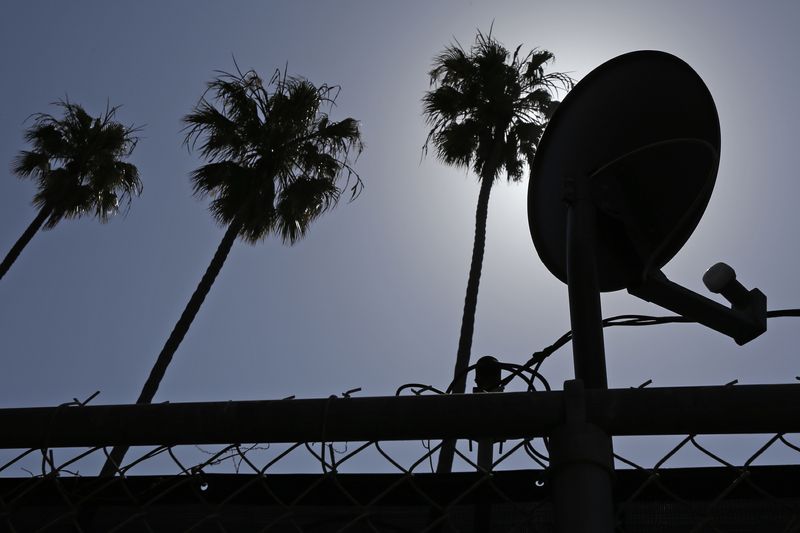By Milana Vinn and Dawn Chmielewski
NEW YORK (Reuters) -DirecTV on Monday agreed to buy EchoStar's satellite television business that includes Dish TV, capping decades of on-and-off talks to create one of the nation's largest pay TV distributors with a combined 20 million subscribers.
The transaction comes at a time when satellite TV services DirecTV and Dish are hemorrhaging market share to competitors such as Netflix (NASDAQ:NFLX) and Amazon (NASDAQ:AMZN)'s Prime Video, which have benefited from changing consumer habits and the rising popularity of streamed video.
DirecTV CEO Bill Morrow told Reuters the combined pay TV company would have the clout to negotiate smaller programming packages tailored to consumers' interests.
It also plans to offer an improved viewer experience that makes it easier for subscribers to find their favorite shows - whether on a traditional TV channel or via streaming - and manage their subscriptions from one place.
"We believe that consumers don't want to be the aggregators - or at least a majority of consumers in the marketplace would not prefer to have to go out and manage all these multiple accounts of those direct-to-consumer SVOD services," Morrow said in an interview, using the industry term for streaming, or subscription video-on-demand.
As part of the two-step transaction, DirecTV will pay $1 to buy the pay TV business called Dish DBS that includes Dish and Sling TV, while agreeing to assume about $9.75 billion of Dish's debt, the companies said in a statement. Dish and DirecTV are launching an exchange offer at a discounted rate for the debt to help extend the maturities.
For the deal to go through, Dish DBS debtholders will have to agree to take a haircut on the debt by about $1.57 billion. With the exchange offer, Dish is attempting to convince its bondholders to become holders in the merged entity.
The deal will provide a crucial lifeline to EchoStar, which was co-founded by telecommunications entrepreneur Charlie Ergen and is currently saddled with more than $20 billion in debt. EchoStar will receive $2.5 billion of financing from buyout firm TPG's credit unit Angelo Gordon and DirecTV to help pay off Dish's $2 billion bond that is due in November.
EchoStar said the deal will help cut its total consolidated debt by $11.7 billion and reduce its refinancing needs through 2026 by $6.7 billion.
"The merger was inevitable... These are both melting ice cubes with plenty of competition increasingly being delivered over the Internet in the vast majority of the US, and they will be better positioned to navigate that environment post a merger," said Jeff Wlodarczak, analyst at Pivotal Research Group.
Shares of EchoStar were down nearly 18% in morning trading. The drop, Wlodarczak said, could be related to the lack of equity in the deal and investors potentially selling on the news, following a near 70% jump so far this year.
The deal also provides a much-needed exit to AT&T (NYSE:T), which is selling its 70% stake in DirecTV to TPG for $7.6 billion. In 2021, AT&T signed a joint-venture agreement with TPG, in which the private equity firm contributed about $1.8 billion in cash in exchange for a 30% stake in DirecTV, which was valued at about $16 billion at the time. AT&T had agreed not to sell its stake in DirecTV for a three-year period, which expired on July 31.
AT&T has been faced with declining distributions from the DirecTV business for several years. For the year ended Dec. 31, distributions from DirecTV came in at $2.04 billion, compared with $2.65 billion a year earlier.
A merger between DirecTV and Dish is likely to test the appetite of regulators to allow for consolidation in the television industry, although the media landscape has been transformed dramatically since the two sides first attempted a merger in 2002 that was nixed by the Federal Communications Commission and the U.S. Department of Justice.
"We believe that the time is right in terms of the multitude of competition that exists out there that is not going to change with the combination of Dish and DirecTV," Morrow said.
ON AGAIN, OFF AGAIN
DirecTV and Dish have held on-and-off talks over the years. Reuters reported earlier in September that DirecTV and Dish Networks had resumed merger talks.
The two pay-TV operators, which are faced with a rapidly-eroding subscriber base, are betting that a combination will help them compete better against pay-TV rivals such as Comcast (NASDAQ:CMCSA)'s Xfinity, Charter Communications (NASDAQ:CHTR)' Spectrum brand, and YouTube TV and enhance their ability to negotiate with programmers.
For Englewood, Colorado-based Dish, the deal would allow the company to focus all of its investments on building out a 5G wireless network. Last year, Ergen, who co-founded both Dish and EchoStar, struck a deal to merge the two companies.
DirecTV said it expects the tie-up with Dish has the potential to generate cost synergies of at least $1 billion every year.
Morrow said the Dish-DirecTV combination would also give Ergen a boost in creating the country's fourth largest wireless competitor. The deal is expected to close in the fourth quarter of 2025, subject to regulatory approvals.
DirecTV, which had a subscriber base exceeding 15 million when it agreed to the deal with TPG in 2021, now has a little than more than 11 million customers.

In its most recent quarterly report, EchoStar said its net pay-TV subscribers declined by 104,000. The total number of Dish TV subscribers stood at about 6.1 million.
Investment bank PJT Partners (NYSE:PJT) advised DirecTV on the deal, while Barclays advised TPG. JPMorgan advised Dish, while Bank of America, Evercore, LionTree and Morgan Stanley also advised DirecTV and TPG.